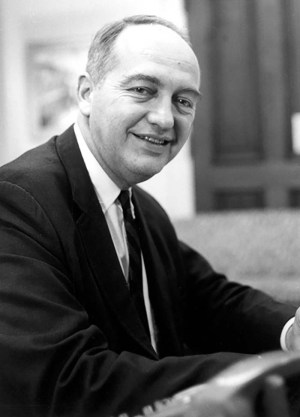Difference between revisions of "Kermit Gordon"
(unstub) |
|||
| Line 4: | Line 4: | ||
|image=Kermit Gordon.jpg | |image=Kermit Gordon.jpg | ||
|nationality=US | |nationality=US | ||
| + | |description=Influential economic advisor during the [[John F. Kennedy]] and [[Lyndon Johnson]] administrations. Later President of [[Brookings Institution]]. | ||
|birth_date=3 July 1916 | |birth_date=3 July 1916 | ||
| − | |birth_place= | + | |birth_place=Philadelphia,Pennsylvania,USA |
|death_date=21 June 1976 | |death_date=21 June 1976 | ||
|death_place= | |death_place= | ||
| Line 20: | Line 21: | ||
|end=June 1, 1965}} | |end=June 1, 1965}} | ||
}} | }} | ||
| − | '''Kermit Gordon''' | + | '''Kermit Gordon''' was Director of the United States Bureau of the Budget (now the [[Office of Management and Budget]]) (December 28, 1962 – June 1, 1965) during the administration of [[John F. Kennedy]]. He continued to serve in this capacity in the [[Lyndon Johnson]] administration. He oversaw the creation of the first budgets for Johnson's [[Great Society]] domestic agenda. Gordon was a member of the [[Council of Economic Advisors]], 1961-1962. After he retired from government service, he joined the [[Brookings Institution]], first as vice president (1965–1967) and then as its president for nearly a decade (1967–1976). During his tenure, Brookings developed a left-of-center reputation chiefly because Gordon was a supporter of the [[Great Society]] and critic of the [[Vietnam War]].<ref>https://web.archive.org/web/20070814201228/http://www.brookings.edu/lib/doubts.htm</ref> |
| + | |||
| + | ==Background== | ||
| + | Born in [[Philadelphia]], [[Pennsylvania]], Gordon graduated from [[Upper Darby High School]] in 1933. He was inducted into Upper Darby High School's Wall of Fame posthumously, in 1980. After graduating from [[Swarthmore College]] in 1938, he was a [[Rhodes Scholar]] (1938–1939) and a [[Harvard]] administrative fellow. | ||
| + | |||
| + | ==Career== | ||
| + | During [[World War II]] he worked in the [[Office of Price Administration]] before serving in the [[United States Army]]. After the war he was a special assistant in the [[Department of State]]'s Office of Assistant Secretary of Economic Affairs until 1946, when he joined the faculty of [[Williams College]]. He was a professor of economics at Williams from 1955 until he joined the Kennedy Administration as a member of the Council of Economic Advisors. | ||
| + | |||
| + | During his time at Brookings, he served on several federal government boards including as Chairman of the Health Insurance Advisory Council (1965–1967), member of the Advisory Council on [[Social Security (United States) | Social Security]] (1968–1971), and member of the Federal Pay Board (1971–1972).<ref>http://www.jfklibrary.org/Asset-Viewer/Archives/KGPP.aspx</ref> | ||
| + | |||
{{SMWDocs}} | {{SMWDocs}} | ||
==References== | ==References== | ||
{{reflist}} | {{reflist}} | ||
| − | {{ | + | {{PageCredit |
| + | |site=Wikipedia | ||
| + | |date=07.07.2021 | ||
| + | |url=https://en.wikipedia.org/wiki/Kermit_Gordon | ||
| + | }} | ||
Latest revision as of 02:54, 15 July 2022
(deep state functionary?) | |||||||||||||||||||||||||
|---|---|---|---|---|---|---|---|---|---|---|---|---|---|---|---|---|---|---|---|---|---|---|---|---|---|
 | |||||||||||||||||||||||||
| Born | 3 July 1916 Philadelphia, Pennsylvania, USA | ||||||||||||||||||||||||
| Died | 21 June 1976 (Age 59) | ||||||||||||||||||||||||
| Nationality | US | ||||||||||||||||||||||||
| Alma mater | Swarthmore College, University College (Oxford), Harvard University | ||||||||||||||||||||||||
| Member of | Brookings Institution, Council on Foreign Relations/Historical Members, Rhodes Scholar/1938 | ||||||||||||||||||||||||
Influential economic advisor during the John F. Kennedy and Lyndon Johnson administrations. Later President of Brookings Institution.
| |||||||||||||||||||||||||
Kermit Gordon was Director of the United States Bureau of the Budget (now the Office of Management and Budget) (December 28, 1962 – June 1, 1965) during the administration of John F. Kennedy. He continued to serve in this capacity in the Lyndon Johnson administration. He oversaw the creation of the first budgets for Johnson's Great Society domestic agenda. Gordon was a member of the Council of Economic Advisors, 1961-1962. After he retired from government service, he joined the Brookings Institution, first as vice president (1965–1967) and then as its president for nearly a decade (1967–1976). During his tenure, Brookings developed a left-of-center reputation chiefly because Gordon was a supporter of the Great Society and critic of the Vietnam War.[1]
Background
Born in Philadelphia, Pennsylvania, Gordon graduated from Upper Darby High School in 1933. He was inducted into Upper Darby High School's Wall of Fame posthumously, in 1980. After graduating from Swarthmore College in 1938, he was a Rhodes Scholar (1938–1939) and a Harvard administrative fellow.
Career
During World War II he worked in the Office of Price Administration before serving in the United States Army. After the war he was a special assistant in the Department of State's Office of Assistant Secretary of Economic Affairs until 1946, when he joined the faculty of Williams College. He was a professor of economics at Williams from 1955 until he joined the Kennedy Administration as a member of the Council of Economic Advisors.
During his time at Brookings, he served on several federal government boards including as Chairman of the Health Insurance Advisory Council (1965–1967), member of the Advisory Council on Social Security (1968–1971), and member of the Federal Pay Board (1971–1972).[2]
References
Wikipedia is not affiliated with Wikispooks. Original page source here